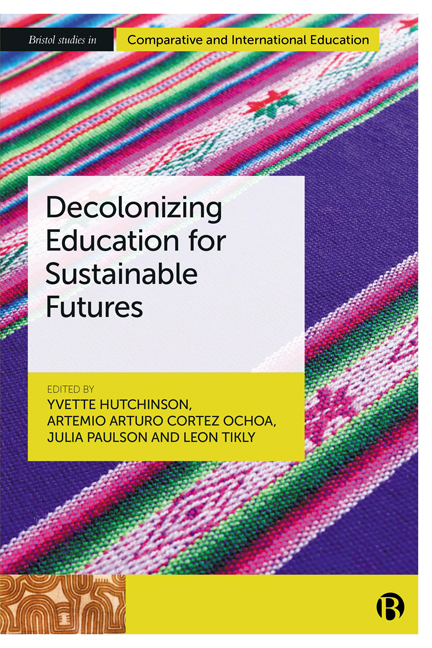Book contents
- Frontmatter
- Contents
- Series Editor Preface
- List of Figures and Table
- List of Abbreviations
- Notes on Contributors
- Acknowledgements
- Introduction
- PART I Connecting Decolonial and Sustainable Futures in Education
- PART II Decolonizing Education for Sustainable Futures: From Theory to Practice
- PART III Education’s Reparative Possibilities: Responsibilities and Reckonings for Sustainable Futures
- Conclusion
- Afterword
- Index
3 - Knowledge Production, Access and Governance: A Song from the Southz
Published online by Cambridge University Press: 18 January 2024
- Frontmatter
- Contents
- Series Editor Preface
- List of Figures and Table
- List of Abbreviations
- Notes on Contributors
- Acknowledgements
- Introduction
- PART I Connecting Decolonial and Sustainable Futures in Education
- PART II Decolonizing Education for Sustainable Futures: From Theory to Practice
- PART III Education’s Reparative Possibilities: Responsibilities and Reckonings for Sustainable Futures
- Conclusion
- Afterword
- Index
Summary
Introduction: the past and present
David Orr, in his poignant 1991 piece focusing not on problems in education, but on the problem of education, stated this (p 1):
If today is a typical day on planet Earth, we will lose 116 square miles of rainforest, or about an acre a second. We will lose another 72 square miles to encroaching deserts, as a result of human mismanagement and overpopulation. We will lose 40 to 100 species, and no one knows whether the number is 40 or 100. Today the human population will increase by 250,000. And today we will add 2,700 tons of chlorofluorocarbons to the atmosphere and 15 million tons of carbon. Tonight the Earth will be a little hotter, its waters more acidic, and the fabric of life more threadbare. The truth is that many things on which your future health and prosperity depend are in dire jeopardy: climate stability, the resilience and productivity of natural systems, the beauty of the natural world, and biological diversity. It is worth noting that this is not the work of ignorant people. It is, rather, largely the result of work by people with BAs, BSs, LLBs, MBAs, and PhDs.
Elie Wiesel added to this in a speech to the Global Forum, Moscow in 1990, that the designers and perpetrators of the Holocaust were the heirs of Kant and Goethe. In most respects, the Germans were the best educated people on Earth, he said, but their education did not serve as an adequate barrier to barbarity. What was wrong with their education? In Wiesel's words: ‘It emphasized theories instead of values, concepts rather than human beings, abstraction rather than consciousness, answers instead of questions, ideology and efficiency rather than conscience’ (Wiesel, 1990, p. 99).
From a genealogical point of view, Orr has argued that historically, Francis Bacon's proposed union between knowledge and power foreshadows the contemporary governance alliance between government, business and knowledge that has wrought so much mischief. Second, Galileo's separation of the intellect foreshadows the dominance of the analytical mind over that part given to creativity, humour and wholeness.
- Type
- Chapter
- Information
- Decolonizing Education for Sustainable Futures , pp. 67 - 82Publisher: Bristol University PressPrint publication year: 2023



